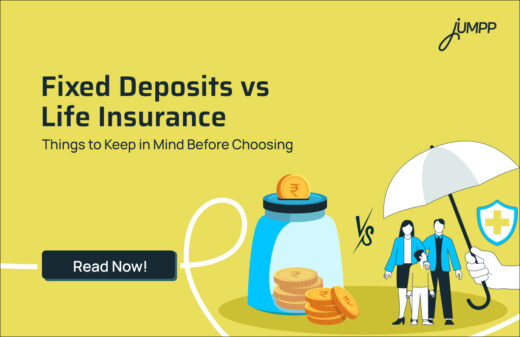Difference Between Insurance and Assurance: Meaning, Types and Examples

Most of us use the words insurance and assurance as if they mean the same thing. This is because both deal with protecting ourselves and our loved ones financially. But in reality, there is a subtle yet important difference between insurance and assurance.
When we talk about insurance vs assurance, you need to know that one focuses on protecting against risks that might happen, and the other covers the events that will happen.
Let us explore the detailed difference between insurance and assurance with some examples.
Insurance vs Assurance – The Difference That Shapes How You Protect Your Future
Insurance covers risks that may happen, while assurance covers events that will definitely happen.
The table below highlights the key differences between insurance and assurance.
What Is the Real Difference Between Insurance and Assurance?
| Basis | Insurance | Assurance |
| Event Covered | Protects against uncertain events like accidents, theft, fire, or medical emergencies. | Covers events that are certain to happen, like death or disability. |
| Objective | Compensates for financial loss and restores the previous financial position. | Provides a guaranteed, pre-decided payout when a certain event occurs. |
| Duration | Usually short-term (e.g., 1 year) and renewable. | Long-term contracts. |
| Coverage | Property, vehicles, health, travel, and general risks. | Life-related risks, such as death or permanent disability. |
| Claims | Multiple claims are allowed during the policy term. | Only one claim is paid on death, disability, or maturity. |
| Examples | Car insurance, health insurance, fire insurance, travel insurance. | Life insurance, term assurance, endowment policies, ULIPs. |
What is Insurance?
Insurance is a financial arrangement that provides protection against unforeseen losses or risks. It is simply a way to protect yourself against risks that may or may not happen.
As per the contract, you agree to pay a fixed premium regularly. In return, the insurer promises to cover your financial loss if an unexpected event occurs.
In simple terms, insurance is about protection against events that might happen.
What are the Types of Insurance?
Insurance comes in many forms. Let us explore the various types of insurance that are available in India.
- Motor Insurance: This is mandatory in India. It protects you against losses from accidents, theft, or damage to your vehicle due to natural or man-made causes.
- Health Insurance: This covers medical expenses. It includes hospital stays, surgeries, and treatments.
- Home Insurance: It secures your home and belongings against risks such as fire, theft, floods, or earthquakes.
- Travel Insurance: This type of insurance protects you while travelling. It covers losses from trip cancellations, medical emergencies abroad, or even lost baggage.
- Term Life Insurance: This provides financial protection for your family if you pass away during the term of the policy. If you survive the term, the policy ends with no payout.
- Professional Indemnity Insurance: This is basically designed for professionals like doctors, lawyers, or consultants. It covers claims of negligence or mistakes made in the course of their work.
Example of Insurance
Let’s say Meera bought her first car.
By law, she needed at least a third-party motor insurance policy, but she decided to go for a comprehensive policy instead. This plan covered not only third-party damages but also her own car, theft, and personal accident benefits.
A few months later, while driving home in heavy rain, her car skidded and hit a pole. The front of the car was badly damaged, and she also suffered a minor injury. Because she had a comprehensive plan, the insurance company paid for the repair costs and her medical treatment.
Now, imagine if Meera had let her policy lapse and not renewed it on time. In that case, she would have had to bear all the expenses herself. This shows how insurance helps transfer financial risks to the insurer. However, this depends upon the fact that your policy should be active.
Want to understand the basics before diving deeper?
Check out our detailed guide on What is Insurance to learn its meaning, features, and why it’s important.
What is Assurance?
Assurance is a type of financial protection that is certain to happen. Unlike insurance, which is based on uncertain events, assurance focuses on events that will definitely occur. Basically, these include death or retirement.
Now, because of this, assurance policies are designed as long-term contracts. They provide security for your family and help with legacy planning.
What are the Various Types of Assurance?
Assurance is not just one kind of policy.
Let us explore the different types of assurance available in India.
- Whole Life Insurance: This covers you for your entire lifetime. Whenever death occurs, the payout is guaranteed to your beneficiaries.
- Endowment Plans: These plans combine protection with savings. If the policyholder survives the policy term, they receive a lump sum payout. If not, the nominee receives the benefit.
- Annuity Plans: These are designed for retirement. They guarantee a stream of income. It can either be for a set period or for life, so that you do not outlive your savings.
- Unit-Linked Insurance Plans (ULIPs): This is a mix of investment and protection.
Herein, a part of your premium goes toward life cover, while the rest is invested in funds you choose. The final payout depends on how those funds perform.
Example of Assurance
Anita buys a whole life assurance policy with a sum assured of ₹75 lakh. This type of policy guarantees a payout.
Now, if Anita passes away at any point, her nominee receives the assured amount. Additionally, part of the premium builds a cash value that Anita can access during her lifetime if she needs funds.
Other types of life assurance include term assurance, endowment plans, and ULIPs.
Insurance vs Assurance: Which One Do You Really Need?
The choice between insurance and assurance depends on your needs.
If you want protection against risks that may or may not happen, like accidents, theft, fire, or medical emergencies, then insurance is the right option.
It gives you financial security in uncertain situations.
On the other hand, if your focus is on long-term financial security for your family or guaranteed support in case of death or disability, assurance is the better choice.
In simple terms:
- Insurance is about covering uncertainties.
- Assurance is about preparing for certainties.
Conclusion
At the end of the day, insurance is your safety cover for the unexpected, while assurance is your promise of certainty. Knowing the difference between insurance and assurance helps you choose the right protection for the right moment.
Insurance vs Assurance- FAQs
Life assurance provides a guaranteed payout, usually on death, ensuring financial security for beneficiaries. Life insurance, on the other hand, covers uncertain events, paying out only if the insured event, like death or accident, occurs during the policy term.
Term insurance covers the policyholder for a specific period and pays only if death occurs during that term. Term assurance guarantees a payout on death, with no focus on the policy term; it is considered a type of life assurance.
Assurance is a financial product that promises a future payout on a certain event, like death or maturity. A guarantee is a legal or contractual promise that something will happen or be fulfilled. It is not necessarily tied to insurance.
LIC offers both term insurance and other life assurance products. LIC’s term plans are specific insurance policies that pay a sum if death occurs during the policy term.
LIC term insurance generally covers death due to natural causes or accidents during the policy term. Deaths excluded may include suicides within the first policy year and specific high-risk activities as per the policy terms.
Term insurance focuses on pure risk coverage for a specific period, usually with lower premiums. Whole life insurance provides lifelong coverage with a guaranteed payout and may build cash value over time. Each serves different needs, so the choice basically depends on what someone wants from a policy.






